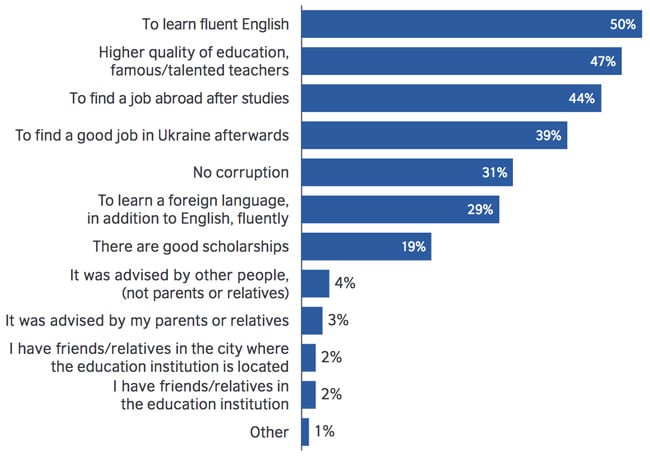Ukrainian students optimistic, outward-looking
A British Council survey of more than 1,200 young Ukrainians finds a high degree of optimism for the country’s future as well as a strong international outlook. More than four in ten respondents (41%) believe that Ukraine’s future is bright. However, a significant percentage (45%) also see emigration as a remedy for some of the country’s current economic challenges, with most of those respondents indicating a desire to leave Ukraine temporarily to pursue career opportunities not available at home.
"The young people surveyed for this report will provide the engine for Ukraine’s prosperity and stability and are the cohort from which the future influencers and leaders of Ukraine will be drawn…the ‘next generation’ is increasingly becoming the ‘now generation’," says the British Council. The cohort in view in the survey results is made up of Ukrainians aged 16 to 35. They responded to an online survey in late-2014, which was subsequently documented in a 2015 British Council report: Hopes, Fears, and Dreams: The views of Ukraine’s next generation.
The survey report reflects some of the same points we have observed in our recent coverage of Ukraine, including the clear international orientation of young Ukrainians and the continuing strong demand for study abroad.
While the country’s higher education capacity is not in doubt - with 800+ universities, colleges, and institutes, Ukraine has a "surfeit of supply" - the quality of programmes on offer is in question. Ambitious reforms are underway, as reflected in a major reform package brought forward by the government in July 2014, and they aim to bring Ukrainian universities into alignment with the Bologna Process (that is, with common European standards for higher education) and to also better address the recognition of foreign degrees. In the meantime, the British Council observes, "Younger generations see the sector as being rife with corruption."
Questions about education at home and the desire to pursue opportunities abroad have helped fuel a steady increase in outbound Ukrainian students over the past decade. "Ukraine’s main resource is its people," adds the report. "It continues to have a well-educated workforce, particularly with strengths in STEM subjects. It also has considerable drive and ambition amongst its young people who are very eager to learn and to improve their education level especially in the times of the crisis."
UNESCO estimates that just under 40,000 Ukrainians were enrolled abroad in 2013, with most, at that point, heading for Russia, Poland, and Germany. As we noted last year, however, those preferences have naturally shifted since 2014. Poland and Germany reportedly remain very attractive to Ukrainian students, but interest has grown in the Czech Republic and, among English-speaking destinations, Canada now has a greater profile as well along with the traditional favourites of the US and UK.
Nearly six in ten survey respondents (56%) said that they want to study abroad, with most indicating that their motivation was to improve their English skills and to access a higher standard of education.

















